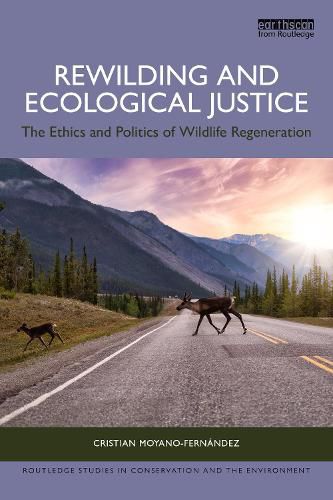Readings Newsletter
Become a Readings Member to make your shopping experience even easier.
Sign in or sign up for free!
You’re not far away from qualifying for FREE standard shipping within Australia
You’ve qualified for FREE standard shipping within Australia
The cart is loading…






This book presents rewilding as a matter of ecological justice. To date, most books and articles on rewilding have viewed this concept through the lens of environmental science, while others have analyzed it from a political, ethical, and philosophical perspective. However, little attention has so far been paid to the justice angle of rewilding. Why and how should justice for rewilding be articulated? In order to address this question, Rewilding and Ecological Justice delves into the capabilities approach extended to nonhumans, distributive theories of ecological justice, welfare biology strategies applied to wildlife, environmental virtues, philosophies of recognition and identity, and decolonial studies. By discussing these narratives, this book is able to outline a roadmap indicating the key factors which should be considered in a justice approach to wildlife regeneration. Given the current and worsening socioecological crisis, rewilding initiatives are likely to increase, so this book explores how to ensure that their development is just for all, inclusive of both humans and nonhumans, drawing on examples from across the globe. This book will be of great interest to students and scholars of rewilding, ecological ethics and justice, environmental philosophy, biodiversity conservation, and ecological restoration.
$9.00 standard shipping within Australia
FREE standard shipping within Australia for orders over $100.00
Express & International shipping calculated at checkout
This book presents rewilding as a matter of ecological justice. To date, most books and articles on rewilding have viewed this concept through the lens of environmental science, while others have analyzed it from a political, ethical, and philosophical perspective. However, little attention has so far been paid to the justice angle of rewilding. Why and how should justice for rewilding be articulated? In order to address this question, Rewilding and Ecological Justice delves into the capabilities approach extended to nonhumans, distributive theories of ecological justice, welfare biology strategies applied to wildlife, environmental virtues, philosophies of recognition and identity, and decolonial studies. By discussing these narratives, this book is able to outline a roadmap indicating the key factors which should be considered in a justice approach to wildlife regeneration. Given the current and worsening socioecological crisis, rewilding initiatives are likely to increase, so this book explores how to ensure that their development is just for all, inclusive of both humans and nonhumans, drawing on examples from across the globe. This book will be of great interest to students and scholars of rewilding, ecological ethics and justice, environmental philosophy, biodiversity conservation, and ecological restoration.